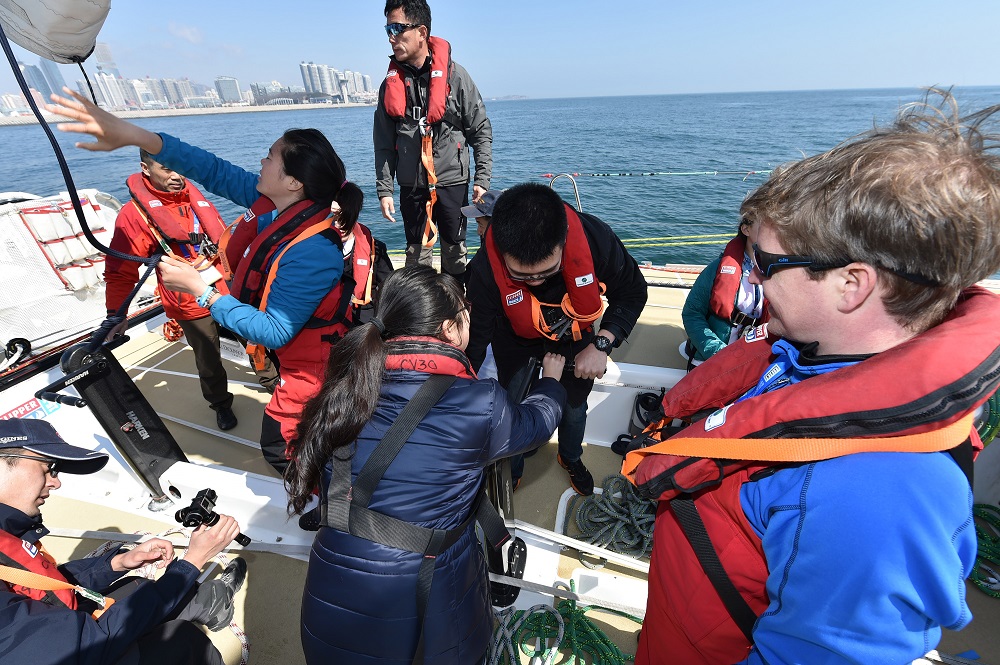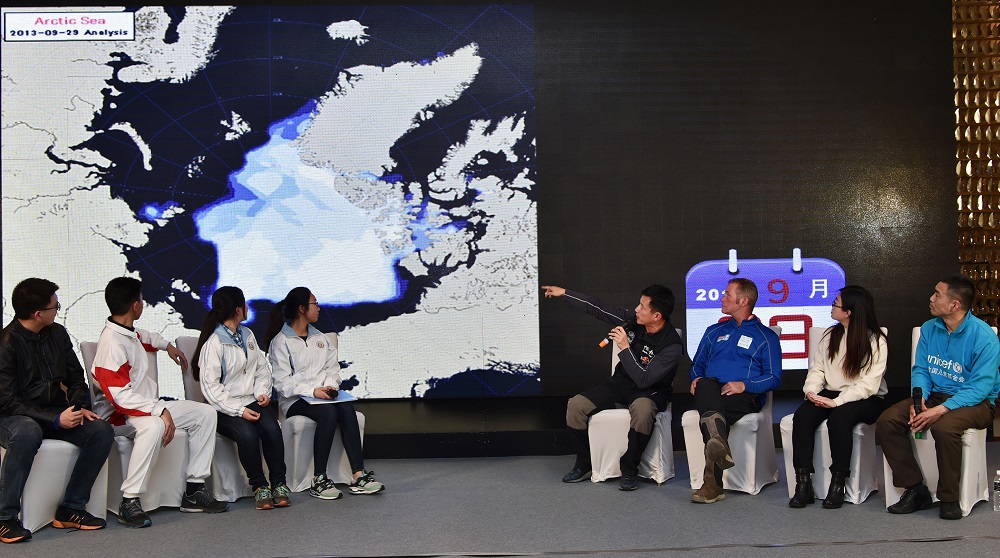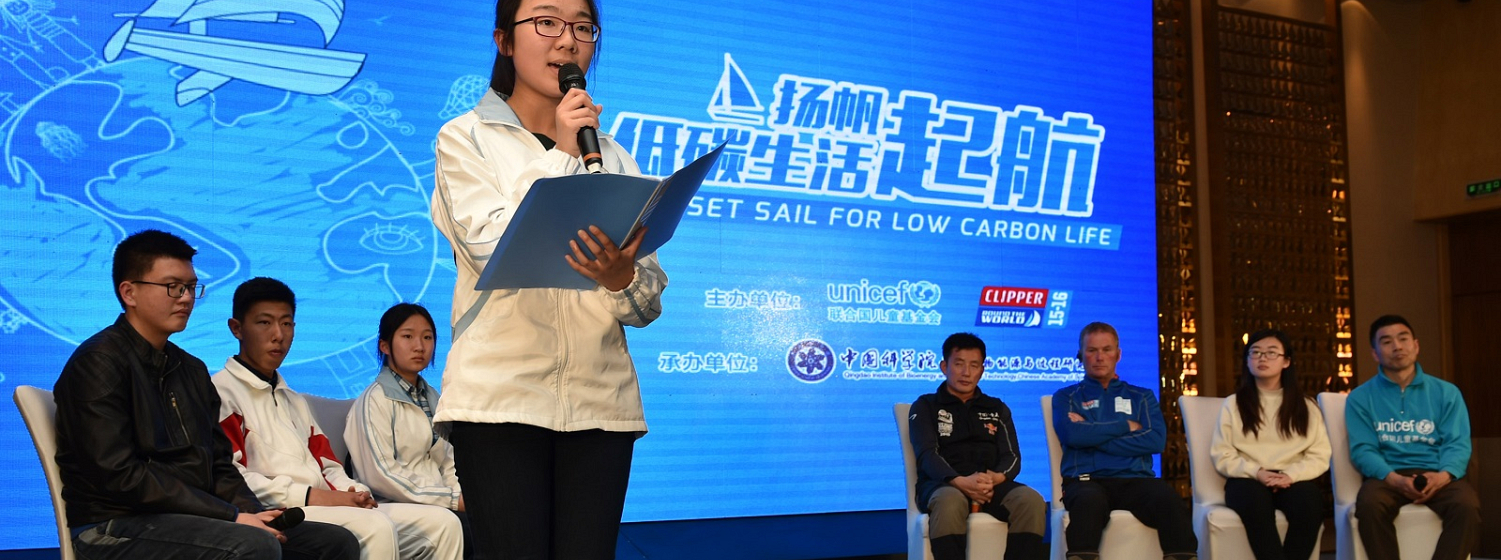Unicef highlights challenge for Children and Environment
17 March 2016
The Clipper Race and our Official Charity Unicef joined forces in Qingdao to highlight a subject China is putting more and more emphasis on; that is the role children have in addressing climate change and creating a clean environment for future generations.
With World Water Day taking place on the 22nd March, local students from the Ocean University of China and middle schools from Qingdao and Beijing were invited out sailing and attended a forum entitled “Set Sail for Low Carbon Life” which provided a live discussion on how young people could be a catalyst for action in addressing environmental challenges.

After taking the students out on the Unicef yacht, Guo Chuan, the famous Chinese sailor
and Clipper 2005-06 Race circumnavigator; joined Unicef Skipper Martin Clough; Unicef Specialist for Water, Sanitation and Hygiene Yang Zhenbo; and
Wang Jia from the Qingdao Institute of Bioenergy and Bioprocess Technology of
Chinese Academy Sciences; answered questions and shared their experiences and
observations of climate change.
The forum supported Unicef’s report ‘Unless we act
now – The impact of climate change on children’, which shows that 530 million children live in areas where
floods are extremely likely to occur and 160 million children in areas where
drought severity is high or extremely high.

Climate change related droughts and floods can destroy water supplies, or leave them contaminated. A child deprived of adequate water and sanitation before a crisis will be more affected by a flood, drought, or severe storm, is less likely to recover quickly, and at even greater risk when faced with a subsequent crisis. This puts millions of children at risk of death and disease.
As part of the Sustainable Development Agenda 2030,
Unicef is committed to addressing climate change in its work for and with
children. The scope of this work includes advocating with Governments to
put in place climate actions that are child sensitive and take children’s needs
into account; engage children and youth on climate change and provide a
platform for their voices to be heard; and factor climate change into existing
programmes to help prevent development gains achieved to-date being
reversed.
Guo Chuan competed in the Clipper 2005-06 Race and
is China’s most recognized sailor. He reminded audiences
of the wonders of the sea and his experiences sailing on oceans. Reflecting on
his recent artic sailing mission, he said “On one hand in the past decade the rapid
melting of the ice in the Artic, makes sailing there possible but on the other
hand, it is a sign of global warming, that adds new challenges for the
environments on which humans and animals rely on for their survival.” He hopes
the younger generation can increase their awareness of environmental protection
and act to address climate change and the impact on our collective future.
In China, Unicef
is working with partners including the NDRC Climate Change office to engage
young people into policy dialogue and decision making. It aims to
increase investments in education, training and awareness-raising of children
on climate change which will help empower them as important stakeholders and
agents of change.
Following the on-stage discussion, Unicef
Skipper Martin Clough said: “Climate change is something I feel very
passionately about. As a parent I feel it is all our responsibility to look
after our planet for our children, and our children’s children, so it was great
to be able to discuss the issue with young people living in one of the world’s
most populated countries here today.”
“I’ve sailed the oceans and climbed for years in the Alps and I definitely see
climate change shaping our landscape. There are parts of the Alps that I used
to go climbing in that no longer exist, which I will never be able to share
with my children, and it is getting worse all the time. In twenty years, if we
keep acting the way we do, the weight of plastic and refuse in the ocean will
outweigh the marine life, which is a shocking reality.”
Martin added: “As the Unicef Skipper
I feel privileged to be able to support important causes such as this and use
the Clipper Race stopovers around the world as a base for discussion on
important world issues.”
The Clipper Race is the world’s largest and longest
ocean race. Powered almost entirely by wind, it is one of the most
environmentally friendly forms of travelling around the planet, and allows
people all over the world a rare opportunity to experience and explore the
power and beauty of the world’s oceans.
Race 9 sets sail from Qingdao to Seattle on 20 March, meaning that by World
Water Day, crew will be in the early stages of their 6000+ nautical mile
journey across the biggest expanse of water in the world, the Pacific Ocean, which
is expected to take 31 days to complete.
Since the Clipper Race left London crew have been fundraising throughout their journey and have now raised over £176,000 for children in danger around the world. Click here to donate and help them reach their £300,000 target.
Click here to find out more about Unicef's work around the world.
